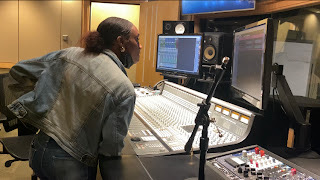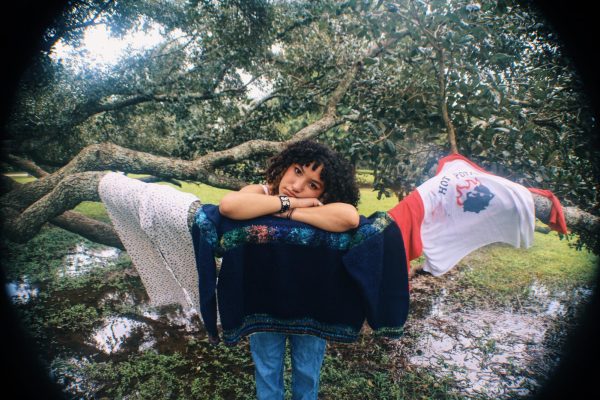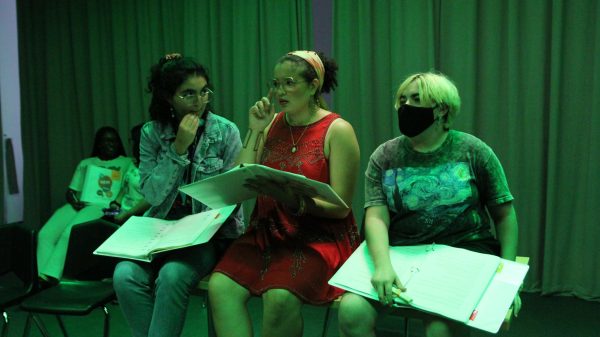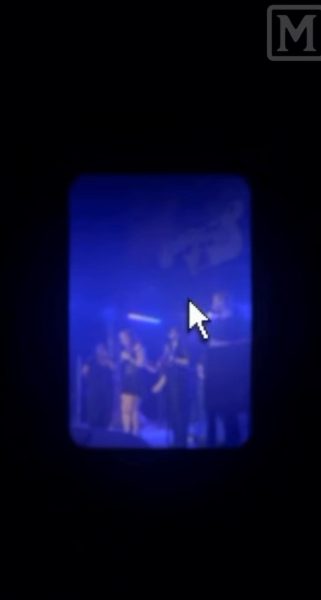Loyola University School of Music Industry to launch a record label

Piper Hudson observes her project on a monitor in recording studio A of the Communications and Music Complex in New Orleans, La.Friday, Oct 15, 2021.
Loyola University’s School of Music Industry will launch a record label course in the spring of 2022. The class is to serve as an experiential learning opportunity to students who desire to learn more about the operational aspects of the music business.
Faculty members of the Music department acknowledge that Loyola’s peer institutions with Music industry curriculum provides student run labels and felt the importance of offering this outlet to students.
Enrollees could view the record label as an in-house internship providing real world experience to apply the lessons learned in previous Music Industry courses. Spots for this course are limited and only open to Music students.
Jeffery Albert, Director of the school of Music Industry and founding member of the record label stated, “The actual class will be 6-8 students per semester and some of those students will overlap. So, once it’s fully up and running , a senior team will sort of head each department and a junior team the understudy for each department.”
When selecting candidates for the course faculty members will review a number of factors to make their final decision. Timothy Kappel, a professor of law and one of the founding members of the label stated, “We’ll be looking very closely at the students that want to be a part of the course to make sure that they’re the right fit and have the right sort of approach , and the right track record of academic success and commitment. ”
The participants selected will be viewed as staff members fulfilling roles in departments such as Artists and Repertoire (A&R) and the Executive Committee. They will work closely with faculty members to select artists, create campaigns, develop music, and negotiate “friendly” contracts according to Kappel.
Non music industry students aren’t to be discouraged due to the many opportunities that will be available to them once the label launches. Student graphic designers, recording artists, record producers, and media relations persons will be outsourced.
Kapple stated, “One of the reasons why we keep the staff small is because we want to give other students here the opportunity to do those things while it’s being overseen by the label staff . Even if you’re not a student there should still be plenty of opportunities to participate, you know with the labels activities.”
As an advisor to the program, Kappel hopes to teach students how to overcome the challenges of being an independently distributed record label.
He stated, “There’s an entrepreneurial element to it right, understanding how business runs. I think one of the things that I want students to see first hand is how difficult it can be for a label to make money and be profitable in the era of streaming.”
Jeffery Albert feels that students are at an interesting point in the history of the music industry and that the role of record labels is changing.
“In the olden days, even when I was in school 20 something years ago, the record labels were the sort of people who threw money at projects and they would see what would stick. They wasted a lot of money and a lot of people got opportunities and records that maybe did something or didn’t do something,” he stated.
Albert stated, “ The record label is a great way to build a 360 experience for the music students into how the modern industry works. It’s the thing that holds it all together organizationally.”
Students are to manage the release of artists’ work. The label will form a contract to license artists’ work for a period of time in hopes of bringing in a profit.
Albert stated, “So they’ll be a core management team that will be in the course and that will get credit and they’ll do all the royalty accounting and all the distributing to Spotify, Apple music , and more.”
When the program launches faculty members look forward to getting the structure in place that builds a team and getting the first few releases out.
Albert stated, “ The long term goals are to build it in a way that is sustainable and that will live beyond this first group of students. And so that hopefully ten years from now there will be students who understand the lineage of what we’ve done.”
Piper Hudson, a Music Industry Junior who’s a recording artist and songwriter, views the launch of the record label as a great opportunity for students to learn the functionalities of the field.
She stated, “Seeing what you can possibly negotiate or how to negotiate properly. I know like most of us in the Music industry studies program we don’t know how to do that and we don’t want to go out there and find ourselves stuck in a horrible deal.”
Hudson is confident of the Music Department’s ability to highlight the gifts of Loyola’s campus through the record label and execute the learning opportunity sufficiently.
She stated, “I really do envision a team. Making sure that the creative director, the manager, the business person are actually fulfilling their roles and fulfilling the duties of those roles and making sure that they’re giving their 100% working with the artists.”
Tim Kappel looks forward to working with students in the spring and will select individuals who have presented enthusiasm and responsibility in previous music industry courses.
He stated, “We’re all excited about it. I think it’s going to be a great thing for the students. This is something we’ve been working on for a few years but it’s now coming to pass.”






